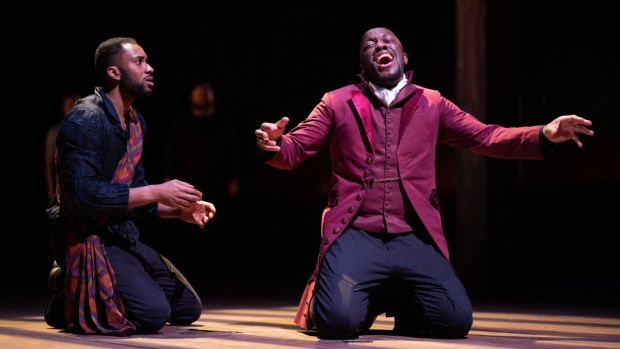Giles Terera's The Meaning of Zong at Bristol Old Vic – review

© Curtis Richard
There is a lot to admire in Giles Terera's debut play The Meaning of Zong. The play throbs with passion and urgency, it has been provided a beautiful production, it has one of the most joyful and heart-racing sound scores I've heard in theatre in yonks, performed by the astonishing Sidiki Dembele, and it is graced with some strong, carefully etched performances.
Yet it's hard to escape the fact that the play ultimately, while important, is doing too much. It's like Terera has thrown everything contained on his post-it notes to see what lands on the page. The prologue is an indication of this, starting with the cast milling and singing on stage, before transitioning into a modern-day Foyles, before then moving back in time to 1781. By itself, the bookends would work, both together and it's a little overloaded. Indeed there is so much going on, so many characters getting a moment in the spotlight, so much intercutting between scenes, so much, well, everything, that its focus can become blunted.
In the program notes co-directors Tom Morris and Terera discuss the African tradition of the writer, storyteller, and performer being the same person and it is interesting to see Terera step up into actor-auteur that normally only Sir Kenneth Branagh gets to occupy. He is a charismatic stage presence, the eye is consistently drawn to his wattage in the way only stars generate. As Olaudah Equiano, he finds dignity in a campaigner who brought to light the atrocities of the ship Zong when more than 130 enslaved Africans were massacred, taking the news to anti-slavery campaigner Granville Sharp and began the events that arguably led to the abolition of slavery in this country. Though there are undoubtedly shades of his Hamilton performance when he is downstage centre in 18th-century garb, he finds the humanity in the goodness that allows the character to remain fascinating.
The scenes inside the courts make for a chilling hearing, as numbers are read out and appeals are made against the original decision for the insurers to pay out for each slave murdered onboard the ship by the crew. There is something about the pageantry of trials that flies in the theatre and these scenes are the glue that holds the piece together. However, the more poetic scenes stay resolutely grounded. The language refuses to take flight. For the second time this year, after Dr Semelweis, Morris' co-vision has produced a production that makes more impact than the text. It's visually and aurally powerful in Dave Price's sound design and Zeynep Kepekli's painterly lighting states and contains some stonking performances.
Chief among these is Michael Elcock as political activist Ottobah Cugoano who brings a powerful zeal and heart-racing beatboxing to the role. Paul Higgins brings fascinating shades of grey to Sharp, who may have his narcissistic traits, while it was nice to see recent Bristol Old Vic Theatre School graduates Kiera Lester and Eliza Smith receive their professional stage debuts in the city that trained them.
Bristol feels like the ideal city to be hosting this premiere now, still coming to terms with the realities of a city propped up on its slave trader routes. This has been a project carefully guided through a six-year process between the team but there is something that still feels not quite complete about it.
I wonder ultimately if it feels like a test drive for a four-part Sunday night BBC adaptation. Is it a great night of theatre? Perhaps not. But it is an important one and one worth catching at this point in the journey if you can.










